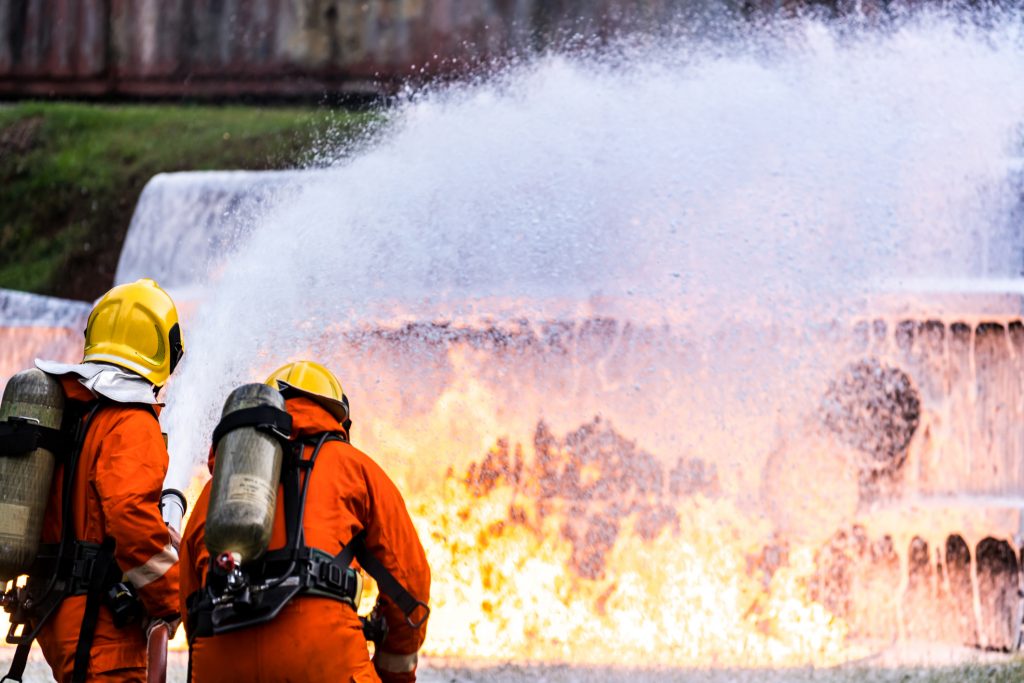Who Is at Risk of AFFF Exposure?

Aqueous Film-Forming Foam (AFFF) is a powerful tool for fighting large-scale fires, particularly those that involve jet fuel or other highly flammable substances. Unfortunately, this substance has also been linked to dangerous health complications, including kidney and testicular cancer.
Given the potentially life-altering consequences that can come with exposure, it is important for anyone working with or near AFFF to understand the risks. If you are living with health consequences stemming from exposure to fire fighting foam, filing an AFFF lawsuit can put you in the best position to recover compensation for medical bills, lost wages, and other damages.
Firefighter AFFF risks
Prolonged exposure to the dangerous chemicals within AFFF increases the risk of cancer substantially. For that reason, those individuals that are most often exposed to fire fighting foam carry the highest risks of dangerous health consequences. Professional and volunteer firefighters are by far the group most likely to face exposure to AFFF on a regular basis.
Firefighting foam is not a new invention. In fact, it has been in use since at least 1902 to combat dangerous oil fires that could not be controlled with water. Over the years, the American military developed its own type of firefighting foam known as AFFF. This foam was quickly adopted by domestic firefighting operations when combating major fires.
The impact of exposure to this foam has been studied frequently. Research from the University of Miami observed that firefighters that work closely with AFFF are found to have extremely high levels of the dangerous cancer-causing chemicals contained in AFFF. In addition to cancer risks, firefighters also face other potential health consequences like fertility problems and compromised immune systems.
Military risks
Domestic firefighters are not the only ones that make regular use of AFFF to fight major fires. The military has long made use of firefighting foam to combat blazes that cannot be contained through traditional means.
Much like with private citizens, firefighters in the military are at the highest risk of dangerous exposure levels. The same is true for individuals that work closely with firefighters on a daily basis.
The unfortunate reality regarding the risks associated with AFFF exposure is that the military has likely been aware of them for decades. Reports indicate the Department of Defense knew of the health risks associated with firefighting foam since the early 1970s. While all branches of the military are working to phase out AFFFs, the use of these substances still continues.
Airport personnel risks
Because of the difficulty associated with fighting jet fuel fires, AFFFs are commonly used at airports. The use of this foam exposes not only firefighting staff at airports to hazardous chemicals but also a variety of other workers as well. Countless staff not only worked nearby when AFFFs were used, but many were also involved in storing, transporting, or cleaning up firefighting foam. All of these airport personnel could potentially face dangerous levels of exposure to AFFF.
Community risks
The harmful chemicals found in firefighting foam can also affect the community at large. Studies have shown that the chemicals within AFFF have found their way into the water supply near locations where firefighting foam was used. Military bases and civilian communities alike have faced harmful levels of exposure due to contaminated drinking water. These chemicals have no way of breaking down naturally, meaning that these so-called “forever chemicals” can stay in the water supply, and in human bodies, permanently.
Discuss your AFFF exposure claim with an attorney
If you or a loved one are suffering health complications after exposure to firefighting foam, protect your rights to compensation by discussing your case for free with an experienced AFFF lawyer. The attorneys of Douglas & London understand the devastating health consequences that can come with exposure to AFFF. Each state has deadlines for filing an AFFF lawsuit, so contact our firm for a free consultation as soon as possible.

